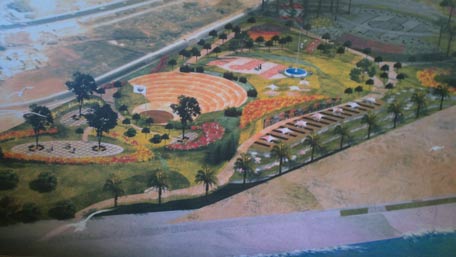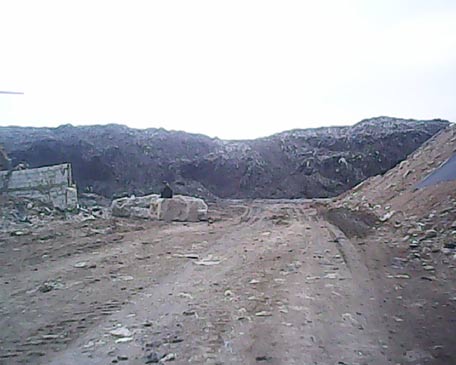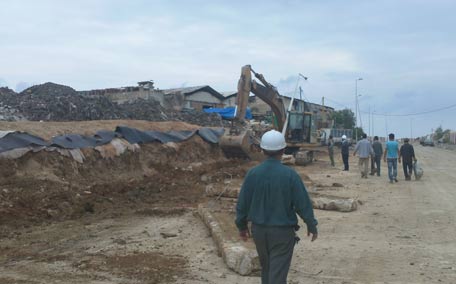- City Fajr Shuruq Duhr Asr Magrib Isha
- Dubai 04:26 05:44 12:20 15:47 18:50 20:08

Approaching the southern entrance of the Phoenician Lebanese port of Sidon, one can still be overcome by the stench coming from a massive heap of garbage.
The heap is just a small part left of what was previously known as “the garbage mountain” that had dominated a large Mediterranean coastal strip in the southern city for four decades before authorities decided to act under recurrent protests.

An army of workers and bulldozers are now seen daily toiling to bury the mountain underground, reluctantly bearing the strong foul smell which is pervading a large part of the historical city of nearly 250,000 people.
More than 70 per cent of the waste hill has been brought down and buried since work was launched 18 months ago and “the garbage mountain” is set to become a mere memory once the project is completed at the end of this year.

“We are pushing ahead with this important environmental project and we expect all the waste will have been buried underground at the end of this year,” Sidon’s mayor Mohammed Ahmed Al Seoudi told Emirates 24|7.
“More than 70 per cent of the waste has been buried and the remaining 30 per cent will be removed at the end of the year...we are constructing a breakwater in the area to prevent further waste dumping into the water and a 65,000 square metre hilltop which will be greened...behind it, we will build a public park with an area of 35,000 square metres...it will have a Roman amphitheatre, terraces, trees, kiosks and other facilities...we just want to reward those people who have stood the smell and the environment damage caused by the garbage mountain for nearly four decades.”

Seoudi said the project would cost the Lebanese government nearly $25 million and is being executed with the help of the United Nations Development Programme. Another project involves the construction of a recycling plant in the same area.
“I can tell you that the removal of this serious environmental threat is in its final stages...the project was launched late but at least it materialized,” he said.
“People now feel better that the garbage mountain would finally disappear and the foul smell that had invaded their homes would be replaced by the smell of trees and flowers...we just want to reward these people for standing such a big problem..”
Seoudi said the garbage mountain had caused substantial environment damage onshore and offshore and that many people suffered from diseases associated with the smell and garbage, including lung diseases and cancer.

“We have information that some of the garbage has also reached the shores of as far as Cyprus, Greece and France...you have to believe this because a large part of the garbage mountain had continuously fallen into the water over a period of 40 years and some of the waste was driven by sea currents to those shores.”
In the absence of recycling plants or proper waste disposal facilities, the garbage mountain, also known as Makab, had been the only dump site for quarter a million residents of the 6,000-year-old city and its surrounding areas since 1975.
From a temporary tiny dumping site, the Makab snowballed into a mountain with an estimated volume of more than 1.3 million square metres.
Located at the southern entrance near the Crusader sea castle, the Makab later became a scene of public protests by worried local residents after it started to collapse into the sea, sending its killing stench into residential areas and giving rise to colonies of mice, rats, cockroaches and various insects and germs.
At night, hundreds of hungry dogs were seen scavenging at the Makab and there are incidents of attacks by the rabid animals on humans.
Besides these daily occurrences, the Makab has killed a large amount of fish and turtles, badly hurting the business of local fishermen and discouraging investors.
Authorities have put the financial damage at hundreds of millions of dollars and believe the environmental damage is beyond comprehension.
According to Sidon’s former mayor Abdul Rahman Al Bizri, the most serious effects of the Makab was the leachate, or the concentrates of organics, which have been penetrating the soil on land and in the sea for the past four decades.
“The damage is massive but we are trying to minimize it by this project…we are constructing a healthy burial place for the Makab to ensure all of its is buried, the smell is gone and damage is reduced….we will plant synthetic grass on the hill top and build a large breakwater that will block waste and prevent further pollution to the sea…we hope this project will put an end once and for all to this environmental tragedy.”
![]() Follow Emirates 24|7 on Google News.
Follow Emirates 24|7 on Google News.